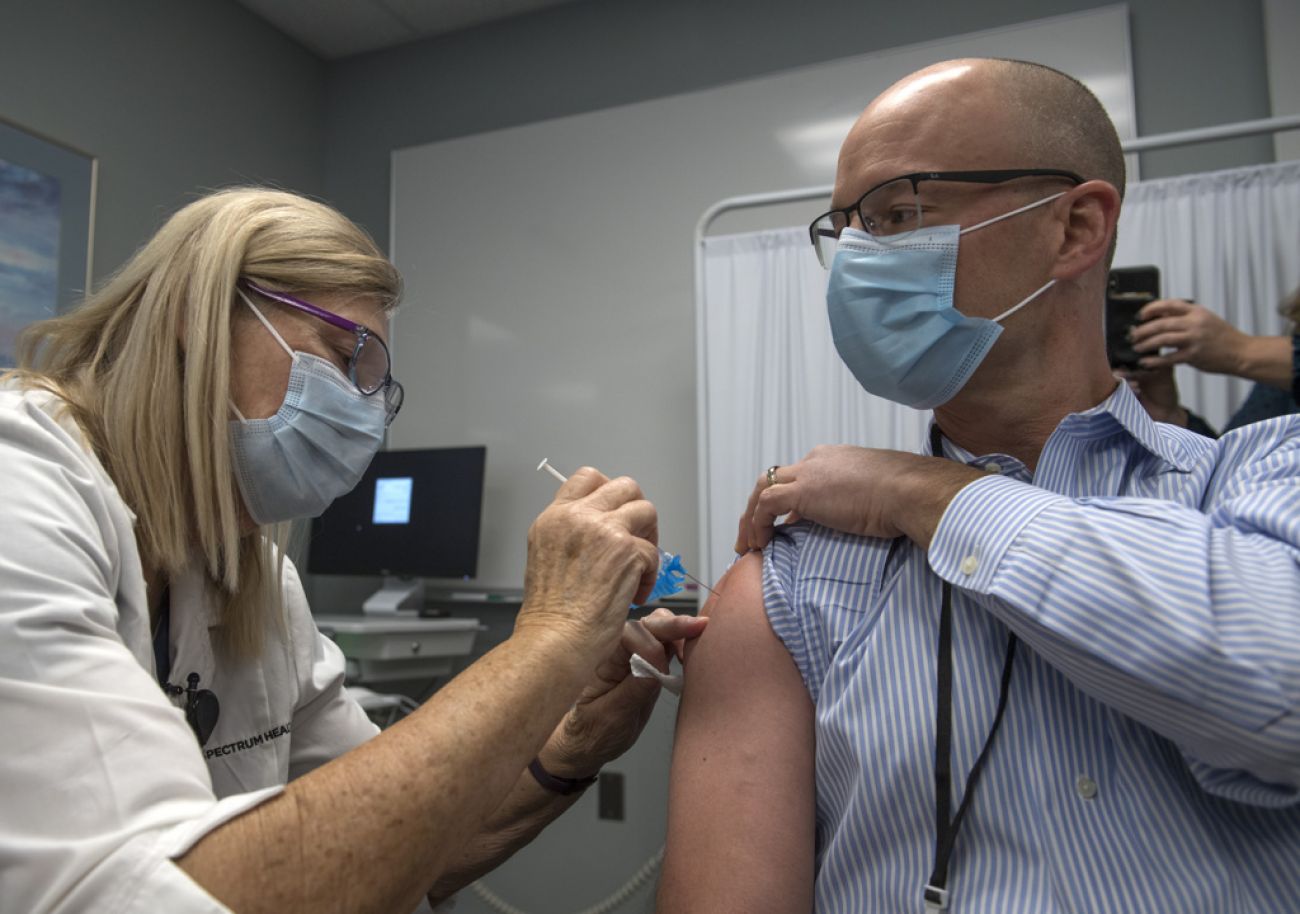COVID vaccines begin in Michigan. Will workers have to take them?

Dec. 21: Michigan health officials wrestling with who will get COVID vaccine next
Dec. 21: Five ethical questions raised by COVID vaccines in Michigan
Michigan health workers began to receive a long-awaited vaccine for COVID-19 on Monday — a “huge milestone in that journey” to beat back the virus, according to Dr. Marc McClelland, 46, a pulmonologist and the first to be vaccinated.
Three and half hours later, McClelland, who has cared for COVID patients at Spectrum Health Butterworth Hospital in Grand Rapids, said he felt “fine — not even a sore arm.”
“I was more than ready to roll up my sleeve and get that vaccine.”
Related stories:
- See where Michigan is shipping coronavirus vaccine, who is getting it
- Michigan releases more details about who gets COVID vaccine first
- Six things to know about the safety of the leading COVID vaccines
- As COVID vaccine nears, Michigan calibrates pitch to wary African Americans
- Michigan health workers, senior facilities likely first for COVID vaccine
- Pfizer’s coronavirus vaccine is being made in Michigan
At least one other shipment of vaccines arrived Monday, delivered to Michigan Medicine at the University of Michigan in Ann Arbor, with more shipments expected in coming days, hospital and state leaders have said.
The vaccine could be the turning point toward a full reopening of the economy, though health leaders have been quick to note that the vaccine likely won’t be ready for distribution to the general public until at least spring — once vaccines have been given to highest priority groups first.
But many may remain more reluctant to embrace a vaccine that was given emergency clearance by the federal government over the weekend for a virus that has now killed more than 300,000 in the United States.
With the nation split on whether to take a COVID vaccine, businesses and other employers are contemplating whether to require their workers to take it.
Both President-elect Joe Biden and the director of Michigan’s health department have said they have no plans to try to mandate the vaccine. Lynn Sutfin, spokeswoman for the Michigan Department of Health and Human Services, also told Bridge Michigan the state won’t make such a demand.
For now at least, it appears Michigan’s hospitals — many of which require nurses, doctors and other employees to receive other vaccinations, such as for the flu —will make the COVID vaccine voluntary only.
The FDA’s emergency use approval creates a legal “gray area” for mandatory vaccines, said Ruthanne Sudderth, a spokeswoman for the Michigan Health & Hospital Association.
“While the science and data … is so robust, at this point we're not requiring this of our team members, but rather strongly recommending,” Dr. Darryl Elmouchi, president of Spectrum Health West Michigan, said at an afternoon news conference to announce the state’s first shipments.
Likewise, the chief clinical officer of Henry Ford Health System and a spokesman for Beaumont Health said the systems will not immediately require employees to receive a vaccine.
The BioNTech/Pfizer vaccine given to health workers Monday was greenlit Friday by the U.S. Food and Drug Administration under an emergency use authorization process. A second vaccine — by Massachusetts-based Moderna — is expected to be considered this week. Both were developed as part of a determined campaign across international borders to vanquish a virus that has brought death and pain (physical and financial) to nearly every corner of the globe.
While the initial vaccine supply remains limited and questions abound among the public, “we respect people’s right to choose,” Dr. Adnan Munkarah, Henry Ford’s executive vice president and chief clinical officer, said Friday in discussing the vaccines.
Vaccine mandates are not unusual in health care. A 2016 survey by MDHHS, found that three in four Michigan hospitals require employees to get flu vaccinations, according to the hospital association.
Issues around mandating the vaccine extend beyond health care. Many schools, for instance, require vaccinations for students to attend. And the U.S. Supreme Court has upheld vaccination requirements.
Which leaves various businesses and industries with some hard choices in the days and months ahead. Will restaurants require vaccines of servers? Will taxis or other driving services such as Uber do so to entice customers back in vehicles? Should one company require workers to be vaccinated, will that put pressure on competitors to do the same?
“There are still a lot of questions out there about whether employers could take that stand,” said Wendy Block, vice president of business advocacy at the Michigan Chamber of Commerce.
The Michigan Chamber plans a webinar in early January to help members understand regulations and whether they can or should require employees to get vaccinated.
So far, Block said, Michigan Chamber members are saying they’ll strongly encourage employees to get the vaccine. Both employers and employees are looking forward to rebuilding the economy, Block said. “Many, if not most, people recognize that as a key piece of that,” she said.
The Biden administration could clarify federal regulations on the COVID-19 vaccine in the workplace, Block said. Existing regulation in both the Equal Employment Opportunity Commission and Occupational Safety Health Administration was created years ago, so more guidance could be coming from the new president, who will be sworn as vaccines are expected to become more widely available.
Employers who want to require a coronavirus vaccine may want to think about what conditions they would recognize for exemptions, including for employees who may raise an objection based on faith or disability, Detroit labor attorney Terry Bonnette of Nemeth Law said in a statement. Bonnette said there may also be legal objections based on federal workplace protection laws, or union agreements.
It had been unclear throughout the weekend when the first Michigan vaccines would arrive, but Spectrum hospital leaders said they received an email alert with a UPS tracking number late Sunday.
“We do now have hope for 2021,” said Tina Freese Decker, president & CEO of Spectrum Health.
Spectrum said it expects another 5,000 doses later this week.
See what new members are saying about why they donated to Bridge Michigan:
- “In order for this information to be accurate and unbiased it must be underwritten by its readers, not by special interests.” - Larry S.
- “Not many other media sources report on the topics Bridge does.” - Susan B.
- “Your journalism is outstanding and rare these days.” - Mark S.
If you want to ensure the future of nonpartisan, nonprofit Michigan journalism, please become a member today. You, too, will be asked why you donated and maybe we'll feature your quote next time!








